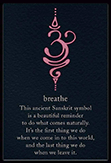Breath
This page was last updated 7/26/24.
 Look to this day, for it is life, the very breath of life. In its brief course lie all the realities of your existence; the bliss of growth, the glory of action, the splendor of beauty. For yesterday is only a dream, and tomorrow is but a vision. But today, well lived, makes every yesterday a dream of happiness, and every tomorrow a vision of hope. Look well, therefore, to this day.
Look to this day, for it is life, the very breath of life. In its brief course lie all the realities of your existence; the bliss of growth, the glory of action, the splendor of beauty. For yesterday is only a dream, and tomorrow is but a vision. But today, well lived, makes every yesterday a dream of happiness, and every tomorrow a vision of hope. Look well, therefore, to this day.
~ Ancient Sanskrit
Natural healthy breath is:
1. In (easily, slowly) & out (easily, slowly) through the nose;
2. Slow (6 breaths/ minute),
3. Light (effortless - more air is not better) and
4. Deep (driven by the diaphragm, but not big breaths).
Stress and anxiety change breathing patterns. When we are stressed we breathe faster and shallower (just upper chest). This breathing pattern often becomes the default with long term stress; and, even when one is relatively not in stress, the habitual fast, shallow breathing feeds the agitation & anxiety which then never goes away.
Bring the body & mind back into normal healthy function by practicing breathing correctly, in synchronicity with your naturally playful, peaceful open heart.
In & out through the nose;
Slow (10 seconds/ breath),
Light and
Deep.
Whenever you can, breath rightly and be present with it.
 Who is aware of the thought? Who is not the thought? Who is the subtle, silent, changeless, still background to the thought? Who is the subtlest? Who is aware of the breath? Who is breathing or being breathed? Who is aware? Who is aware of the thought? Who is not the thought? Who is the subtle, silent, changeless, still background to the thought? Who is the subtlest? Who is aware of the breath? Who is breathing or being breathed? Who is aware?
Sohamasmi is a mantra from the Isa Upanishad, meaning: Even when I pray, I am You. Even when I am You, I pray to You. Hamsa means white swan representing divine spirit and the Goddess Gayatri.
[inhale] I So Ham
[exhale] Am Ham Sa
 Dialogue from Brihad-Aranyaka Upanishads: Dialogue from Brihad-Aranyaka Upanishads:
“Ushasta Chakrayana questioned him (Yajnavalkya): “Yajnavalkya”, said he, “Explain to me him who is the Brahma present and not beyond our ken, him who is the soul in all things”.
“He is your soul, which is in all things”.
“Which one, O Yajnavalkya, is in all things”
“He who breathes in your breathing-in (prana) is the Soul of yours which is in all things."
| 










































